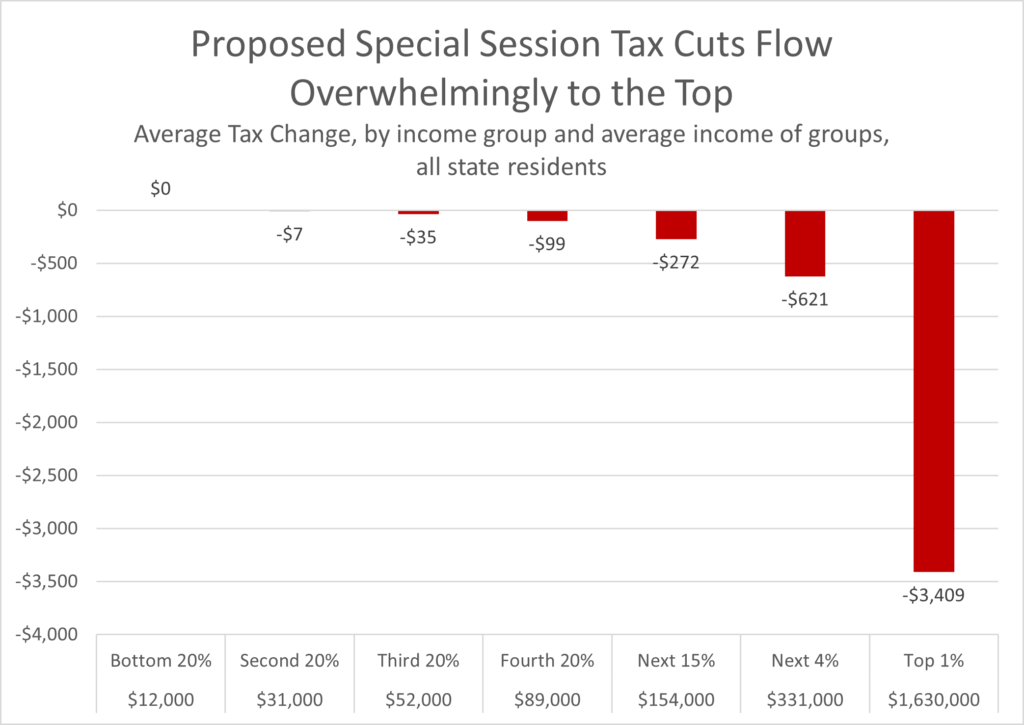
In a dramatic development, Arkansas lawmakers are returning to work at the state Capitol this week, after Gov. Huckabee Sanders called for a special session of the Legislature last Friday. Top of the agenda? Whether Arkansas should adopt another round of costly income tax cuts that primarily benefit wealthy households and corporations, on top of cuts already enacted several times in recent years (including this April).
This should sound familiar: Over the past decade, Arkansas policymakers have repeatedly slashed personal and corporate income tax rates, draining a huge amount of funding, about $1.6 billion, from schools, health services, and other crucial public assets that our public dollars support, with the benefits overwhelmingly flowing to people and companies at the very top.
Just this spring, for instance, state legislators approved a tax cut that provides about 80% of the benefit to the state’s richest 20%, while shortchanging the state budget by $139 million a year. With that amount of money, we could have created a new universal 8-week paid parental leave for every mother and father in the state.
The tax plan under consideration this week simply offers more of the same.
The latest proposal (SB8 and HB1007) would permanently drop the state’s already-low top personal income tax rate down to 4.4% from its current 4.7%, as well as reduce the rate on corporate income to 4.8% from its current 5.1%. Similar to prior rounds of cuts, these changes would offer only meager benefits to most low- and middle-income taxpayers, versus a windfall to our state’s wealthiest households and corporations. That’s largely because when states like Arkansas reduce income taxes, they usually make up for the lost dollars either by reducing funding for or eliminating programs or by hiking sales taxes and fees.
Indeed, according to an analysis from the Institute on Taxation and Economic Policy (ITEP), an estimated 70% of this tax cut will go to the top 20% of earners in Arkansas, who make an average annual income of $264,000. The top 1% – people with average incomes over $1.6 million annually – would benefit from an average tax cut of $3,409, while a middle-class Arkansas family making $52,000 would only see a $35 tax cut. Meanwhile, about 75% of the corporate tax cut is likely to leave the state entirely.

A small one-time tax credit also included in the bill, supposedly to help taxpayers better deal with high inflation, isn’t likely to make much difference. That’s largely because it’s “nonrefundable,” which means it can only zero-out a person’s income tax bill versus provide a refund, unlike some other state and federal credits for workers and families. As such, it won’t do much to help many Arkansans with low-paying jobs and on fixed incomes, who already pay more in sales and excise taxes than state income taxes.
Adding insult to injury for everyday Arkansans? The plan will also sap support for crucial services people and communities already rely on, as well as reduce the state’s potential to make new investments that would help our state thrive down the road.
As proposed, the personal and corporate rate cuts will cost at least $185 million a year in lost revenue, according to the bill’s sponsors, and as much as $222 million annually according to analysis from ITEP. For context, those totals are about what the state spends to support the University of Arkansas’s flagship campus at Fayetteville, and exceed the combined-cost of state services that protect children’s welfare and help people with developmental disabilities live with dignity. (The bill’s small tax credit would add about another $100 million in one-time losses, which also could go toward more pressing state needs).
Some state lawmakers will likely argue that Arkansas can afford those losses, due to lingering surpluses left over from strong revenue growth over the past two years. But revenues have been slowing significantly nationwide, including in Arkansas, due to a range of factors including geopolitical disruption, an uneven stock market, and – yes – prior income tax cuts. The cuts would also do little if anything to help the state’s economy, or to retain or attract new residents, contrary to what tax-cut proponents routinely claim.
Lastly, even in the event state revenues do continue to run in the black for a while longer, top-down income tax cuts simply aren’t the best way for state leaders to spend them. Arkansans struggling to get to work, or keep a roof over their head, or feed their families, or to help send their kids to college would get much more bang for their buck from stronger state support for key services and ladders of economic opportunity. Better schools, more affordable housing and smoother access to health care are only a few investments that would make a bigger difference for Arkansas’s communities a paltry tax cut.
These are among the reasons why, this week, instead of proceeding further down the tax-slashing path, Arkansas Legislators should move in a different direction.
Rather than further reducing state revenues, our state leaders should keep in mind that Arkansas ranks 43rd in the country on children’s well-being, and that one in five Arkansas children live in poverty. They should remember that Arkansas has the highest rate of women dying from pregnancy and birth complications in the country, and that many families don’t have access to child care, resulting in parents leaving the workforce. And they should think about the nearly 135,000 Arkansas children facing hunger, and the more than 1,000 Arkansans with developmental disabilities waiting to get community-based services.
Those children, workers, families and communities don’t need another round of income tax cuts for wealthy households and corporations. To help more Arkansans thrive, what they need is a policy approach that protects and raises adequate tax revenues to not only support and protect current services, but to pave the way for new ones that are needed to achieve a brighter future for our state.
